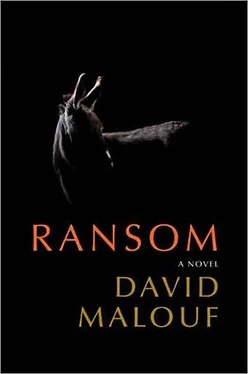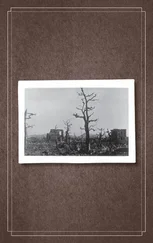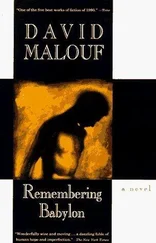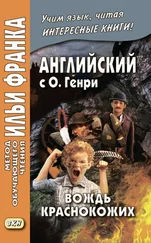Achilles had been hunting in one of the ravines beyond the palace. He had killed a hare. Great whoops of triumph preceding him, he had come bounding up the steps into the courtyard to show his father what he had got.
Ten years old. Long-haired, wiry, burnt black by the Phthian sun. Still half-wild. His soul not yet settled in him.
Peleus was angry at the intrusion. He turned to reprove the boy, but gentled when he saw what it was. He gestured to Achilles to be still. Then, with a small helpless showing of his palms — You see what it is, I too am a fond parent — apologised to his guest, Menoetius, King of Opus, for this unintended discourtesy.
Achilles, still panting from his long run in across the fields, set himself to be patient. Idly at first, with no intimation of what all this would one day mean to him, assuming still that the centre of the occasion was the hare trailing gouts of blood where it hung from his wrist, he stood shifting from foot to foot, waiting for the visitor’s business to be done and his father’s attention to be his.
The story Menoetius had to tell was a shocking one.
The boy with the big hands and feet was his son, Patroclus. Ten days ago, in a quarrel over a game of knucklebones, he had struck and killed one of his companions, the ten-year-old son of Amphidamas, a high official of the royal court. Menoetius was bringing the boy to Phthia as an outcast seeking asylum.
In a voice still hollow with wonder at how, in an instant, so many lives could be flung about and broken, the unhappy man led them back to the fatal morning.
Two players, fiercely engaged in the rivalries of the game, squatting in the shade of a colonnade and laughing. Taunting one another as young boys will. Eyes raised to follow the knucklebones as they climb, with nothing untoward in view.
For a long moment the taws hang there at the top of their flight; as if, in the father’s grave retelling of these events, he were allowing for a gap to be opened where this time round some higher agency might step in and, with the high-handed indifference of those who have infinite power over the world of conjunction and accident, reverse what is about to occur. The silence is screwed up a notch. Even the cicadas have shut off mid-shriek.
The boy whose fate is suspended here stands with parted lips, though no breath passes between them; lost, as they all are, in a story he might be hearing for the first time and which has not yet found its end.
Achilles, too, stands spellbound. Like a sleeper who has stumbled in on another’s dream, he sees what is about to happen but can neither move nor cry out to prevent it. His right arm is so heavy (he has forgotten the hare) that he may never lift it again. The blow is about to come.
The boy Patroclus tilts his chin, thin brows drawn in expectation, a little moisture lighting the down on his upper lip, and for the first time Achilles meets his gaze. Patroclus looks at him. The blow connects, bone on bone. And the boy, his clear eyes still fixed on Achilles, takes it. With just a slight jerk of the shoulders, an almost imperceptible intake of breath.
Achilles is as stunned as if the blow was to himself. He turns quickly to his father, on whose word so much depends.
But there is no need to add his own small weight of entreaty. Peleus too is moved by the spectacle of this boy with the mark of the outcast upon him, the brand of the killer, who stands waiting in a kind of no-man’s-land to be readmitted to the companionship of men.
So it was settled. Patroclus was to be his adoptive brother, and the world, for Achilles, reassembled itself around a new centre. His true spirit leapt forth and declared itself. It was as if he had all along needed this other before he could become fully himself. From this moment on he could conceive of nothing in the life he must live that Patroclus would not share in and approve.
But things did not always go smoothly between them. There were times when Patroclus was difficult to approach, too touchily aware that, for all Achilles’ brotherly affection, he himself was a courtier, a dependant here. He would draw back, all pride and a hurt that could not easily be assuaged. What Achilles saw then on the clouded brow was what he had been so struck by in the first glance that had passed between them — the daunted look that had captured his soul before he even knew that he had one — and he would hear again, as if the memory were his own, what Patroclus was hearing: the knock of bone on bone as two lives collided and were irrevocably changed.
No, Achilles told himself, not two lives, three. Because when Patroclus relived the moment now, he too was there. Breath held, too dazed, too spirit-bound to move, he looked on dreamlike as that other — the small son of Amphidamas, whose face he had never seen — was casually struck aside to make way for him.
He thought often of that boy. They were mated. But darkly, flesh to ghost. As in a different way, but through the same agency and in the same moment, he had been mated with Patroclus.
The end when it came was abrupt, though not entirely accidental.
After weeks of truce, the war had resumed with a new ferocity, at first in isolated skirmishes, then, when it emerged that there was division among the Greeks and that Achilles, the most formidable of them, had withdrawn his forces, in a general assault. Hector, slaughtering on all sides, had stormed the walls of the encampment and fought his way to the Greek ships. The Greek cause had become desperate.
So too had Patroclus. Held back from the fight because of Achilles’ quarrel with the generals, he was going earnestly from place to place about the camp hearing news of the death of this man, the wounding to near death of another, all dear companions. He said nothing, but his pure heart was torn, Achilles saw, between their old deep affection for one another, which till now had been beyond question, and a kind of doubt, of shame even. He sees my indifference to the fate of these Greeks as a stain to my honour, Achilles told himself, and to his own.
He knew every movement of Patroclus’ soul — how could he not after so long? — but would not allow himself to be swayed.
Patroclus had appeared at last in the hut and positioned himself, grim-faced and silently distraught, on a stool close to the entrance where his presence could not be ignored. There he waited.
Achilles, full of resentment at being judged, even in silence, and called to account, went on busying himself with nothing. Every moment of disunity between them was a torment to him. His quarrel with Agamemnon was a just one, his pride was touched. Did he have to argue that again? Agamemnon, because he was by nature vain and contentious, or because he had all along envied the ascendancy among them of a younger man, had openly insulted him.
The generals had awarded him as a prize of war a captured slave-girl, Briseis, and in the time she had been with him he had grown fond of her. Then Agamemnon’s own prize, Chryseis, was ransomed and sent back to Troy, and the great commander, in his lordly way, had claimed his prize, Briseis, in her place. He had refused of course and not politely. And when Agamemnon, incensed at the rebuff, had roared and raged and crudely berated him, he too lost his temper and, barely able to restrain himself from striking the man, had stormed out of the assembly, retired to his hut, refused all further contact and withdrawn his troops from the battle-lines.
If the Greek generals were suffering now they had only themselves to blame. He and all his followers, including Patroclus, and his father Peleus, and their homeland Phthia, had been subjected to outrageous affront.
Of course he knew only too well what Patroclus intended by his brooding presence, and had for a long time endured it; but unused, where Patroclus was concerned, to holding in what he felt, had let angry disappointment at last get the better of him.
Читать дальше












